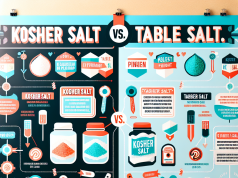Contents
From Heartburn to Constipation: Black Pepper’s Natural Remedies for Digestive Issues
Are you tired of dealing with digestive issues such as heartburn or constipation? Look no further! Black pepper provides natural remedies that can help alleviate these uncomfortable symptoms.
Black pepper has been used for centuries as a medicinal spice due to its numerous health benefits. Not only does it add flavor to your meals, but it also aids in digestion and can be a great ally in relieving digestive problems.
Heartburn: If you frequently experience a burning sensation in your chest after eating, black pepper can help. Its stimulating properties can enhance the production of digestive juices, promoting a healthier digestion process and reducing the occurrence of heartburn.
Constipation: When it comes to constipation, black pepper’s natural laxative effect can be highly beneficial. It stimulates the intestines, encouraging bowel movements and relieving constipation. Additionally, black pepper is known to improve overall digestion, preventing the development of future constipation issues.
Adding black pepper to your meals is a simple and effective way to incorporate this natural remedy into your diet. Whether you sprinkle it on salads, soups, or main dishes, you can enjoy the flavorful benefits while also supporting your digestive health.
However, it is important to note that while black pepper can provide relief for mild digestive issues, it may not be suitable for everyone. If you have severe or persistent symptoms, it is always recommended to consult with a healthcare professional for proper evaluation and treatment.
In conclusion, black pepper offers natural remedies for common digestive issues such as heartburn and constipation. Including this spice in your diet can help improve digestion and provide relief from discomfort. Enjoy the taste and reap the benefits!
From Heartburn to Constipation: Black Pepper’s Natural Remedies for Digestive Issues
Introduction
Heartburn and constipation are two common digestive issues that many people experience at some point in their lives.
While there are various over-the-counter medications available to alleviate these symptoms, natural remedies can be a
healthier alternative. In this blog post, we will explore how black pepper, a commonly used spice in cooking, can help
relieve heartburn and constipation.
1. Black Pepper for Heartburn Relief
Heartburn, characterized by a burning sensation in the chest, occurs when stomach acid flows back into the esophagus.
Black pepper has been found to help reduce heartburn symptoms due to its ability to increase saliva production, which
in turn aids in neutralizing stomach acid.
One effective method is to consume a mixture of a pinch of black pepper and a teaspoon of honey. This combination can
soothe the irritated lining of the esophagus, providing relief from heartburn symptoms. However, it is important to
note that this remedy may not be suitable for everyone, especially those with underlying health conditions. It is
always best to consult with a healthcare professional.
2. Black Pepper for Constipation Relief
Constipation refers to difficulty in passing stools or infrequent bowel movements. Black pepper can act as a natural
laxative, promoting bowel movements and relieving constipation. The active compound in black pepper, called
piperine, stimulates the digestive system, facilitating the smooth movement of waste through the intestines.
One easy way to incorporate black pepper into your diet for constipation relief is by adding a pinch of freshly
ground black pepper to your meals. It not only imparts a rich flavor but also aids in digestion, preventing
constipation. However, individuals with sensitive stomachs or gastrointestinal disorders should use black pepper
cautiously, as it may exacerbate their symptoms.
3. Precautions and Considerations
While black pepper can offer natural remedies for heartburn and constipation, it is important to exercise caution
and consider the following:
- Always use freshly ground black pepper for maximum benefits.
- If you have any underlying health conditions or are on medication, consult with a healthcare professional before
using black pepper as a remedy. - Start with small quantities of black pepper to assess your tolerance and monitor any adverse effects.
- Black pepper may not be suitable for everyone, particularly those with gastritis, stomach ulcers, or other
digestive disorders. Discontinue use if it worsens your symptoms.
4. Conclusion
Black pepper, a commonly used spice with numerous health benefits, can provide natural relief for both heartburn and
constipation. By incorporating black pepper into your diet in a responsible manner, you can potentially alleviate
these digestive issues and enjoy improved overall digestive health. However, it is vital to understand your personal
health circumstances and consult a healthcare professional for personalized advice.
Related Post:
The Benefits of Black Pepper for Digestion
Keywords:
heartburn relief, constipation relief, black pepper, natural remedies, digestive health, spice, piperine, digestive system
Frequently Asked Questions
1. What are the natural remedies for heartburn?
There are several natural remedies you can try to alleviate heartburn. Some of these include:
- Drinking a mixture of warm water and black pepper
- Chewing on fresh ginger
- Consuming papaya or pineapple, both of which have natural enzymes that aid digestion
2. Can black pepper help with indigestion?
Yes, black pepper can help with indigestion. It stimulates the production of digestive enzymes, which can improve digestion and reduce indigestion symptoms.
3. How can black pepper help with constipation?
Black pepper has natural laxative properties and can help stimulate bowel movements. It is recommended to consume black pepper in moderation to avoid any adverse effects.
4. Are there any precautions to take when using black pepper for digestive issues?
Yes, it is important to note that excessive consumption of black pepper can lead to irritation of the digestive tract. It is best to use black pepper in moderation and consult with a healthcare professional if you have any underlying digestive conditions.
5. Are there any other natural remedies for digestive issues?
Yes, there are several other natural remedies for digestive issues. Some of these include:
- Drinking chamomile or peppermint tea
- Consuming probiotic-rich foods, such as yogurt
- Avoiding trigger foods, such as spicy or greasy foods
Enhancing Digestion with Black Pepper
The Role of Piperine in Digestive Health
Black pepper, also known as Piper nigrum, is a popular spice used worldwide to add flavor and aroma to various dishes. Aside from its culinary uses, black pepper has also been known for its potential digestive benefits. The primary compound responsible for these digestive benefits is piperine, found in abundance in black pepper.
Piperine is a bioactive compound that stimulates the release of digestive enzymes in the pancreas, aiding in the breakdown of food components such as proteins, fats, and carbohydrates. This enhancement of enzymatic activity can lead to improved digestion and nutrient absorption, ensuring that our bodies can make the most of the food we consume.
Supporting Scientific Evidence
Several studies have explored the effect of piperine on digestion, highlighting its potential benefits. One study published in the Journal of Ayurveda and Integrative Medicine found that piperine significantly increased the secretion of digestive enzymes, promoting efficient digestion and reducing digestive disorders.
Another study published in the Journal of Agricultural and Food Chemistry revealed that piperine enhances the bioavailability of nutrients such as vitamins A and C, coenzyme Q10, and beta-carotene. This means that consuming black pepper with certain foods or supplements can maximize the absorption of these essential nutrients by the body.
Incorporating Black Pepper into Your Diet
To reap the digestive benefits of black pepper, consider incorporating it into your daily diet. Sprinkle freshly ground black pepper on your meals, soups, stews, and even salads. Be mindful of using it in moderation as the spice can be quite potent.
Furthermore, it’s important to note that individual tolerance to black pepper may vary. It is always advised to start with small amounts and gradually increase consumption to gauge personal compatibility.
Conclusion
Black pepper, enriched with piperine, can positively impact digestion by stimulating the release of digestive enzymes and improving nutrient absorption. Incorporating black pepper into your diet can help ensure efficient digestion and maximize the benefits of the food you consume. So, don’t hesitate to add a dash of this flavorful spice to your meals and enjoy both its taste and digestive advantages.
For more detailed information on black pepper, you can visit the Black Pepper Wikipedia page.
Heartburn Relief
- Drink a mixture of black pepper and water to relieve heartburn.
- Avoid fatty and acidic foods that can trigger heartburn.
- Elevate your head while sleeping to reduce heartburn symptoms.
Constipation Relief
- Include black pepper in your diet to stimulate digestion.
- Stay hydrated and consume fiber-rich foods to prevent constipation.
- Engage in regular physical activity to promote bowel movements.








































